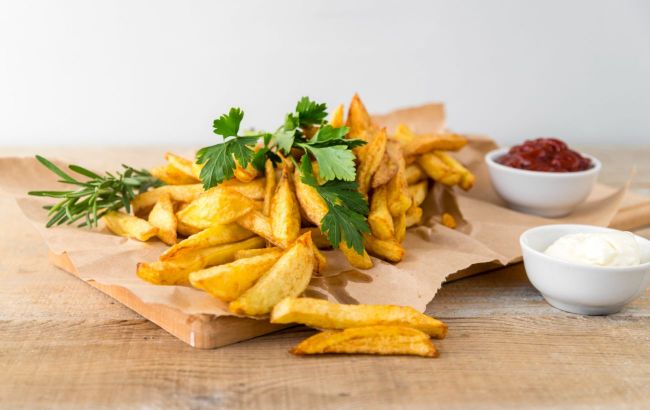Time bomb: Are French fries harmful to your health and how often can you eat them?
 Are French fries bad for your health (photo: Freepik)
Are French fries bad for your health (photo: Freepik)
French fries are among the most popular foods. There’s a common belief that they are harmful to human health, but this isn’t entirely true, and there are certain nuances.
Are French fries harmful?
A 2017 study closely followed nearly 5,000 elderly people who consumed potatoes. It found that frequent consumption of potatoes, including fries, was not directly linked to an increased risk of death from disease. However, eating fries twice a week did increase the risk of cardiovascular problems.
“If you don’t have excess weight, don’t smoke, consume little or no alcohol, and stay physically active, those factors still play a crucial role,” said Ukrainian nutritionist Anastasia Holoborodko. She noted that it’s not the potatoes but the large amounts of refined oils and salt that are harmful. It’s important to remember that trans fats are a "ticking time bomb for the body."
Excessive fats and salt can seriously damage blood vessels.
"Twice a week is harmful, but eating fries once to three times a month won’t cause any problems," the expert added. The general recommendation is to limit consumption to 15 fries per serving.
The impact of trans fats on health
Trans fats can be both natural and artificial. Natural trans fats are found in meat and dairy products from animals like cattle, sheep, and goats, forming naturally when bacteria in their stomachs digest grass. Moderate consumption of these fats is not harmful.
However, artificial trans fats, also known as industrial or partially hydrogenated fats, are dangerous. These fats are byproducts of the hydrogenation process, like when margarine is made from sunflower oil. Studies have shown that trans fats increase cardiovascular disease risk and mortality.
They are most commonly found in baked goods, pastries, margarines, processed foods, and snacks.
Sources: a study in the American Journal of Clinical Nutrition, Healthline, and the Instagram page of Ukrainian nutritionist Anastasia Holoborodko.
This material is for informational purposes only and should not be used for medical diagnosis or self-treatment. Our goal is to provide readers with accurate information about symptoms, causes, and methods of detecting diseases. RBС-Ukraine is not responsible for any diagnoses that readers may make based on materials from the resource. We do not recommend self-treatment and advise consulting a doctor in case of any health concerns.

